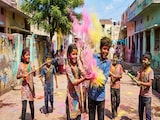- Supreme Court junks Telangana plea against High Court interim stay on 42% reservations for OBCs
- Increase would have taken overall quotas past the 50% cap set by the top court in 1992 Indira Sawhney case
- The state argued the increase - which meant overall quotas would be 67 per cent - is 'a policy decision'
The Supreme Court on Thursday afternoon knocked back a Telangana government plea challenging the High Court's interim stay on expanded reservations - past the 50 per cent cap set by the top court in its landmark 1992 Indra Sawhney judgment - for Other Backward Classes, or OBC, communities.
The state argued that increasing quotas - granting 42 per cent reservation for OBCs for local body elections, which meant overall quotas would be 67 per cent - is 'a policy decision.
"... a unanimous resolution of all parties supports this policy. How can it be stayed without pleadings? Barring the first few pages (of the High Court order), no reasons have been given for the stay," senior advocate Abhishek Manu Singhvi, appearing for Chief Minister Revanth Reddy's government, said.
"Who are these people (i.e., the High Court) to stay without even pleading... when it was passed unanimously by the legislature," he told Justice Vikram Nath and Justice Sandeep Mehta.
On the contention the quotas will cross the 50 per cent cap, Singhvi said 'there is a misconception that the Indra Sawhney case established a rigid 50 per cent cap...'
He argued the judgment allows a breach in exceptional circumstances.
From the other side, senior advocate Gopal Sankaranarayanan defended the High Court decision by citing previous Supreme Court judgements on the matter of reservation limits.
"The order we challenged is one that increased reservation to 42 per cent for OBCs... which takes everything to well over 60 per cent," he said, citing the 2010 K Krishna Murthy judgement of the top court, delivered by a Constitution bench, that affirmed the 50 per cent camp.
The High Court order in the spotlight was delivered last month by Chief Justice Aparesh Kumar Singh and Justice GM Mohiuddin, on petitions challenging three government orders, one of which ordered the 42 per cent reservation and the other two prescribed guidelines.
The High Court pointed out the increase appeared to violate the 50 per cent cap and referred to the Supreme Court's 'triple test' in such scenarios, which includes establishing a commission to conduct an empirical study, specifying proportion of reservations based on that study.
The third is the critical note - that such reservation cannot exceed 50 per cent of the total seats reserved for Scheduled Castes, Scheduled Tribes, and OBC candidates taken together.
The High Court ruled that prima facie increased reservation failed this test and, therefore, stayed all three orders till it takes a final decision on their validity.















